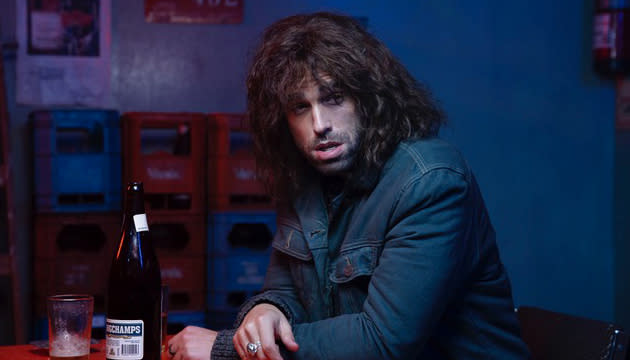Pablo Fendrik on HBO Latin America’s ‘Amongst Men’, Flirting with Genre & the Promise of a New Format

HBO Latin America’s latest production, “Entre Hombres” (“Amongst Men”), made with Argentina’s Pol-ka, also marks one of Latin America’s first series ever in the prestige Berlinale Series section.
It was worth the wait. Based on Germán Maggiori’s same-titled novel and adapted for the screen between the author and series director Pablo Fendrik, the show boldly plunges spectators into the crime world of 1990s Buenos Aires. A world of moral decay where only the most violent are fit to survive.
More from Variety
TVCO Sells Latvian-Finnish drama 'The Pit' to Germany's Arsenal - EFM (EXCLUSIVE)
Amazon's Audible Enlists Filmarket Hub to Scout Series Scripts in Europe
Fendrik whose “Ardor” – a pointed Amazon-set reworking of the Western, starring Gael Garcia Bernal and Alice Braga which hit Cannes in 2014 as a special screening – flexes his narrative skills in “Amongst Men” on the miniseries format, fresh off large success with the two-season “Bronze Garden,” regarded as one of the best series that HBO Latin America has ever made.
The result in “Amongst Men” is a highly kinetic, vibrant gender blender that dispassionately observes its despicable characters as their narratives drive towards head-on collision with all cylinders firing. Wonder pulp standing tall in a unique SETTING and a shining example of Latin America’s talent and potential.
As the studio streamers expand in Latin American, ramping up production volume, they are also offering a new narrative landscape which promises to bear rich fruits.
Variety talked with Fendrik as “Amongst Men” premiered in Berlinale Series.
Did “The Bronze Garden’s” acclaim and distribution give you that vital confidence to think that you could make very good series?
Of course it was a learning curve for a couple of years, but it has been a very beautiful path to go down. I came with my knowledge from film and had to adapt to the way “content” is made. I don’t say “television” because it isn’t television any more. I learnt a new skill-set shooting “The Bronze Garden” because it was so different from film in the way we made it, the amount of things you have to do every day and every week and that super high standard that HBO sets.
Did you also feel that with “The Bronze Garden” you were also experimenting with HBO to see what you Would be allow to do – in budget for a scene, camera set-up – and it was as if with it your discovered your freedom?
I’m still grateful for the amount of freedom they gave me to do “Amongst Men.” It was a big step-up from “The Bronze Garden”: a lot more characters, a lot darker, a lot riskier, a lot bleaker. I really felt again like a filmmaker making “Amongst Men.” This is like making a four-hour film. We went from eight days per episode on “The Bronze Garden” to almost 15 on “Amongst Men.”
The show shifts between genres without finally settling into just one. It’s part horror, part thriller, part Western. A sort of “post-genre.” Could you comment?
I love genres. But where I’ve had the best experience was when we flirted with genre, appropriating certain aspects and bringing them to the narration without falling entirely into one particular genre with its canons and limitations. In that sense, the material was already multifaceted and rich. It allowed us to approach it from various angles and exploit different elements of crime, noir and hard-boiled genres. Always announcing to the audience that what they’re watching is a story. It always felt important when working with the actors that they understood that this is a fictional story, in capital letters.
Did you feel you were breaking news ground for Latin American TV – or film?
As soon as we understand we are working with a new format, as soon as we stop thinking about it as cinema or TV, the sooner we’ll start finding out what it can be. We can embrace this new reality and take it to incredible places. As long as executives, decision makers, have the vision and give creatives the space and freedom to offer the best of our creativity, we can take this format to another level. My experience is that the old studio mentality – where executives have the last say on every single aspect of development -usually doesn’t register in [improved] results.
As your title points out, the show is a deep dive into the most toxic of masculinities, without ever falling into black-and-white contrasts. How did you approach the subject?
My team and I talked long and hard about this. More than half the crew were women. We approached the subject with immense care. Nothing you see on the screen is gratuitous. Everything has been thought through and weighed. Beyond any discourse, this is the story of some men at their worst. You cannot get darker, more violent, more toxic than this. The idea was that if we could address the worst version of masculinity, we could talk about so many things. But it was a leap of faith. We often asked ourselves whether we were going too far. But to be a narrator implies taking risks, and we knew the series was risky. But risk-taking is not the same as being rude, nor aggressive nor violent. This is a narrative with a high level of aggression but there’s a difference between the aggressiveness of the narration and the violence it narrates. I have no doubt someone will watch the show and think we’re some recalcitrant sexists, but that a very superficial interpretation.
Best of Variety
Sign up for Variety’s Newsletter. For the latest news, follow us on Facebook, Twitter, and Instagram.

 Yahoo Finance
Yahoo Finance 